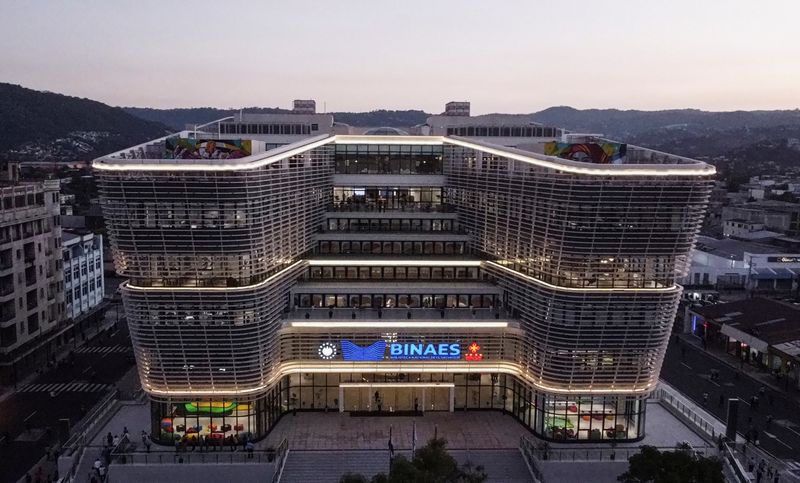By Diego Oré, Sarah Kinosian and Nelson Renteria
SAN SALVADOR (Reuters) - When El Salvador President Nayib Bukele published a private WhatsApp conversation with the top U.S. diplomat in the Central American country two years ago, he was sending a message of his own: I will not take orders from the United States.
U.S. officials had for months been protesting Bukele's support for moves like dismissing judges and bucking constitutional term limits – measures they said endangered the country's young democracy.
Jean Manes, the chargé d'affaires whose messages intervening on behalf of a detained former mayor were unmasked, left the country. She said the bilateral relationship between the erstwhile allies was "on pause," citing attacks on the U.S. by Bukele's "paid media machine."
Two years later, the United States is publicly cozying up to Bukele, a populist anti-establishment renegade who on Sunday romped to re-election in a landslide - even as it continues to emphasize concerns over the erosion of human rights and democracy.
Now, more than ever, the U.S. needs Central American nations like El Salvador to curb migration to the southern border. It is also striving to offset growing Chinese influence in Latin America.
In October, the State Department's top Latin America diplomat, Brian Nichols, visited El Salvador and posed for photos with Bukele. He sought to "give a message that democracy is the most important form of government," the U.S. embassy said at the time.
And on Monday, U.S. Secretary of State Antony Blinken congratulated Bukele on his win, saying the United States would prioritize "good governance" and "fair trials and human rights in El Salvador" as part of its plan to tackle the causes of migration.
Three U.S. State Department officials Reuters spoke to said they have moved more critical diplomacy behind closed doors, a tactic they have found effective given Bukele's rebellious style and rebukes of perceived foreign meddling.
Bukele has since toned down the kind of inflammatory comments that marked his spat with Manes.
He has also grown savvy at milking the regional tug-of-war for influence between the United States and China.
"(Bukele) has used the approach to China as a negotiating card," said Ana Maria Mendez, of the Washington Office on Latin America. "(He) threatens or challenges U.S. foreign policy by engaging with China."
RAPPROCHEMENT
The more reserved public U.S. stance may be a tacit acknowledgement that Bukele's success in smashing gang violence has led to a decline in migration, officials from both countries said.
Salvadorans fleeing violence and poverty have migrated to the U.S. for decades, hitting record levels in 2021. Following the gang crackdown that began in March 2022, the number of Salvadorans reaching the U.S. southern border fell, dipping 36% from 2022 to 2023, according to U.S. Customs and Border Protection.
Bukele has also implemented measures such as hefty taxes on flights from 57 largely African countries to dampen onward U.S. migration.
Bukele will be conscious of the need to stay on good terms with El Salvador's largest trading partner and benefactor. The U.S. disbursed $629 million in aid between when Bukele took office in 2019 and 2022 – more than went to Honduras, a country with almost double the population, according to USAID.
The U.S. officials said they recognize Salvadorans support the gang crackdown, but that they are pushing Bukele to wind it down.
Under a "state of exception" stretching nearly two years, Bukele's government has detained over 75,000 Salvadorans - 1.1% of the country's population. Rights groups have documented 150 deaths in prison, while Salvadorans have lost their rights to due process.
"We recognize the profound challenge El Salvador faced curbing gang violence," a U.S. State Department spokesperson said in an email. "(But) the state of exception must be an exception."
WAITING IN THE WINGS
At the same time, there are growing ties between China and El Salvador.
In recent years, China has spent $500 million in infrastructure projects that include a state-of-the-art sports stadium, a tourist pier and water purification plants.
A futuristic library near the capital's main square flies a giant Chinese flag and was inaugurated with a drone display of Bukele's face.
"El Salvador will look to work as closely with China as possible in the coming years. China is an economic partner that is willing to look the other way on human rights and other issues," said Margaret Myers, from Washington-based think tank Inter-American Dialogue.
China's embassy in San Salvador was quick to congratulate Bukele and his party "for the historic victory in these elections" this week.
Although of limited commercial importance in itself, El Salvador offers China a foothold in Central America, and in 2018 broke relations with Taiwan in favor of China.
Bukele's government must walk a careful line, though. In mid-2023 it stopped negotiating a 5G deal with Chinese telecoms provider Huawei, which has been the subject of U.S. sanctions, and now is working with Washington in "to achieve a secure nationwide 5G service using trusted vendors," said a U.S. State Department spokesperson .

"El Salvador wants to do trade with everyone," Bukele said during his victory speech on Sunday night. "What we are not going to be is your lackeys."
(This story has been corrected to rectify the year that El Salvador broke relations with Taiwan in paragraph 24)